Description and application of rosehip syrup

Today's medicine is able to offer a wide variety of different synthetic drugs and procedures. However, healing decoctions, syrups and tinctures still have not lost their relevance. Moreover, not a single doctor undertakes to dispute the unusual effectiveness of natural remedies and their components.
Rosehip is one of the most popular plants that are used in medicine for the treatment and prevention of various diseases. In particular, the use of rosehip syrup is widespread.

Application history
Rosehip is a small shrub with unusual fruits, which belongs to the class of wild roses. Most often it is found in the northern regions, however, in general, it is distributed not only in Siberia, but also throughout Russia, and even in some European countries.
Superiority in the use of wild rose today is disputed by many peoples. It is authentically known that the use of its fruits is mentioned by the ancient Greeks, Romans, Egyptians.
Already in Tsarist Russia, rose hips were stocked up with nobility for the winter. By that time, it was often used as food. Local healers actively used almost all components of the shrub, including roots and leaves, to create a variety of decoctions and tinctures.

Already today, medicine is able to scientifically confirm and even substantiate the expediency of such prescriptions. Not surprisingly, modern rosehip syrup is not inherently "new". Means similar to it were successfully used several hundred years ago.
They were recommended by healers for healing wounds, relieving nervous tension, eliminating itching, colds. Until now, this plant has not lost its relevance.

Compound
The medicinal properties of wild rose, which, under certain conditions, make it possible to achieve an extraordinary therapeutic effect, are due to the content of a mass of natural components in it.
Rose hips are a real storehouse of all kinds of vitamins, minerals, acids and individual elements. At the same time, practically all of them are preserved in the prepared syrup and are easily absorbed by our body.
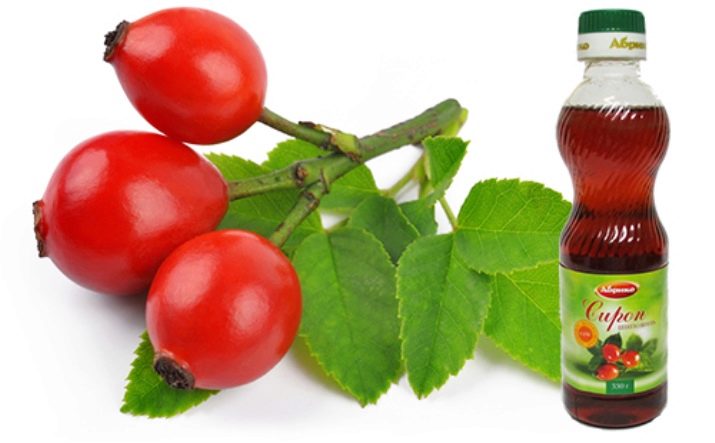
The main components of rosehip syrup are the following vitamins and minerals.
- Vitamin A. Provides a natural boost to the immune system. It has a positive effect on the functioning of the organs of vision, and also heals the skin.
- Thiamine or vitamin B1. This is an element indispensable for our body, since it is it that ensures the normal breakdown of carbohydrates and the production of energy from them. Improves the functioning of the muscles of the heart, as well as the nervous system.
- Riboflavin or vitamin B2. Necessary for the normal absorption of energy elements like carbohydrates. In addition, riboflavin is necessary for the normal "production" of red blood cells and the prevention of anemia.
- Vitamin C. Also well known as ascorbic acid.This is a very "multifunctional" component of rose hips, since it ensures the normal growth of collagen and, therefore, the connection of cells in the body in general. Thanks to vitamin C, our teeth, bones, gums are kept healthy, the cardiovascular system is maintained in order.

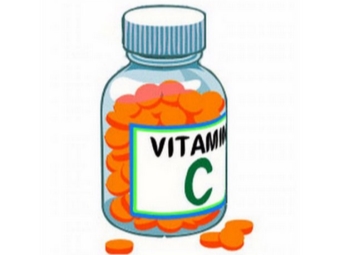
- Vitamin E is one of the most powerful antioxidants. Its main task is to protect cells from damage and destruction. It is also actively involved in the production of red blood cells.
- Potassium improves the conduction of impulses through the nervous system. This element is indispensable for the normal blood supply to brain tissue.
- Calcium known to many as a trace element necessary for strengthening bone tissue. However, it also plays an important role in the regulation of excitatory and inhibitory processes in the central nervous system, normalizes the activity of many enzymes and stabilizes blood cholesterol levels.
- Magnesium has a pronounced anti-ischemic property. It improves the supply of oxygen to myocardial tissues, which has a beneficial effect on the heart as a whole, and also has a vasodilating effect and prevents the risks of hypertension. Magnesium is also known for its calming effect on the nervous system.


- Sodium also has a moderate vasodilating effect. Also, this component is necessary for the normal transport of substances between the cells of the body and within them. Sufficient sodium content can prevent heat stroke or sunstroke in summer.
- Phosphorus It is an indispensable component of bone tissue known to all. He also takes part in the growth of cells and the organization of the storage of genetic information in our body.Phosphorus maintains the normal state of the acid-base environment in the stomach.
- Iron. An important component of the natural protein hemoglobin, which carries oxygen with the blood, and is also necessary for the normal synthesis of ATP, the energy unit of the human body. In addition, iron molecules have a stimulating effect on the immune system and take part in the elimination of toxins.

Beneficial features
Needless to say, how extensive are the qualities of rosehip syrup, which retains most of all the elements of the fruit. This tool has gained popularity not only in medicine, but also in cosmetology and everyday life as a useful supplement.
Rosehip syrup can be used not only for prevention and maintenance therapy, but even for full-fledged treatment.
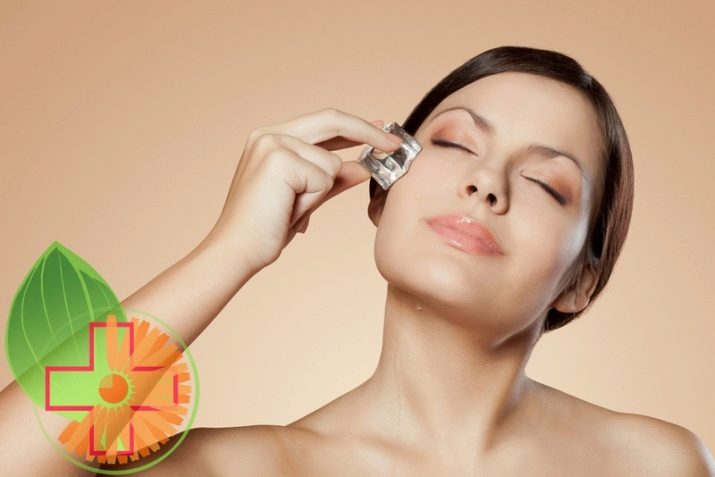
Here is just a small list of useful properties of syrup.
- Elimination of inflammation processes of both internal organs and skin. Provided by the high content of vitamins and flavonoids. Thus, the rosehip preparation can be useful in the case of most acute and chronic diseases.
- Rosehip syrup is an indisputable benefit for the human body in case of intoxication. This can be either exogenous intoxication, for example, alcohol or spoiled food, or endogenous - provoked by an overdose of anticoagulants or autoimmune processes.
- It has a fairly pronounced general tonic effect on the body due to the high content of trace elements and vitamins. Rosehip also increases hemoglobin and, accordingly, oxygen saturation of all organs.


- Improves the rheographic properties of blood, thereby stabilizing blood circulation in many organs, including the brain. This is one of the most important anti-ischemic properties of rose hips, which makes it suitable for regular use in older people with an increased risk of strokes or heart attacks.
- Normalizes the processes of blood clotting. It is noteworthy that rosehip syrup does not increase the erythrocyte sedimentation rate and does not reduce it, but only maintains a normal balance of all coagulation indicators in the body. Due to this, it can be successfully used both in case of a risk of bleeding, for example, in hemophilia, and for the prevention of blood clots in the vessels.
- Stabilizes intra-arterial pressure. Mostly we are talking about reducing high pressure due to the pronounced effect of expanding the walls of blood vessels. Thus, rosehip syrups are a fairly effective supportive agent for hypertensive patients.


- Rose hips strengthen bone tissue well due to the increased content of trace elements, in particular calcium and phosphorus.
- It has a diuretic effect, which can be shown in syndromes with severe peripheral edema or in some diseases of the genitourinary system.
- It has a pronounced detoxifying effect. Rosehip syrup successfully plays the role of a sorbent in case of food or alcohol poisoning.
- Accelerates all processes of growth and regeneration of individual tissues, in particular, connective.

Indications
Rosehip syrup has a very wide range of effects, due to which it can be successfully used during the treatment of many diseases.However, it is worth noting that this remedy is not always able to replace a full-fledged drug therapy.
In some cases, the syrup successfully allows you to get rid of most of the unpleasant symptoms, and sometimes it is used as an additional maintenance drug, which directly depends on the severity of the disease.

To date, rosehip syrup is recommended by doctors in case of the following diseases and syndromes.
- In case of cough. Rose hips are especially useful when it comes to dry and hysterical cough, as it will soften the irritation of the mucous membrane of the larynx. However, you can use rosehip cough syrup when the first sputum appears, as it will help to separate it.
- For constipation rose hips also provide good help to the intestines. It contributes to the normal digestion of food, the absorption of all the necessary components, as well as the strengthening of feces.
- Since rose hips are rich in iron, calcium and magnesium, the syrup made from them is perfect for combating various diseases. anemia. Regular use will avoid the risk of a drop in hemoglobin in the blood, and in some cases even increase it.

- For various inflammatory diseases. For example, with pancreatitis, cholecystitis, gastritis, sinusitis. At the heart of all these pathologies is the process of acute inflammation, and rosehip syrup copes with such problems perfectly.
- Rose hips are also recommended while breastfeeding.. This is useful for the immunity of the mother and baby, which will absorb with milk a lot of vitamins and minerals that are indispensable for the growing body.
- Also, rosehip syrup receives a lot of positive feedback as weight loss products. Stabilizes the natural processes of metabolism and catabolism, and also produces a noticeable tonic effect.
A more extensive list of recommendations for use may contain instructions for the syrup. In general, it can be successfully used both in the treatment of children and adults, and in order to prevent, for example, colds in the winter season.

One of the advantages of rosehip syrup is the possibility of its use for children.
Many pediatricians note that such natural remedies have more effective prevention on a growing organism, than synthetic drugs.
You can drink rose hips for children over two years old. Sufficiently thick and sweet syrup is best diluted in a small amount of water. The usual dosage is about half a teaspoon 2-3 times a day. In this case, the entire course of treatment is one month, after which it is advisable to take a short break.
Older children, for example, from 4 years old, can drink a whole teaspoon several times a day, and at the age of 12 years, a dosage of one tablespoon is acceptable.

Contraindications
Like any drug, rosehip syrup has not only useful properties. If used incorrectly, it can even cause harm or aggravate the disease.
Before using the syrup, it is best to immediately make sure that you have no contraindications to it.
- Rosehip is contraindicated in the presence of certain diseases of the gastrointestinal tract. You should be especially careful if you have a stomach or duodenal ulcer, gastritis.The fact is that the syrup often contains a fairly high concentration of vitamin C in the form of ascorbic acid, which can cause complications such as bleeding or perforation of the gastric mucosa.
- Quite often, the drug causes a slight thickening of the blood, since it can remove excess fluid and increase the formation of red cells.
This in itself is not dangerous, but if you have an increased risk of blood clots or have a history of thrombophlebitis, then it is better to stop using the syrup.
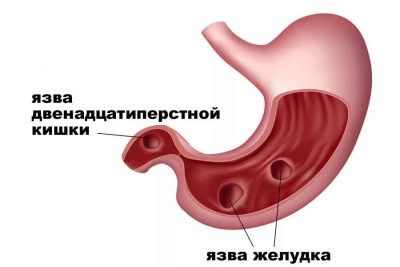
- Another contraindication is dental disease, since the remedy can have an aggressive effect on the enamel. In any case, after drinking rosehip syrup, it is best to rinse your mouth with plain warm water.
- Endocarditis, that is, inflammation of the inner lining of the heart, is also a reason to limit or completely abandon the remedy.
- Despite the fact that rosehip is able to normalize blood pressure, it should not be considered as a complete therapy. Moreover, with severe hypertension or hypotension, it is better to use the syrup with caution and under regular monitoring of blood pressure.
- The remedy is strictly contraindicated in children who have a history of high blood clotting.
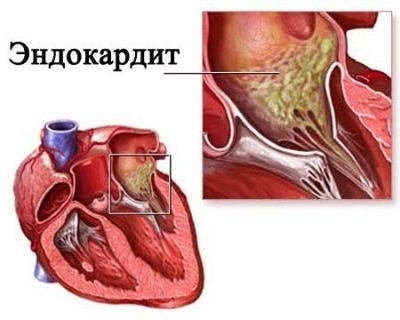
- One of the peculiar side effects of rose hips is the gradual “washing out” of natural calcium from the body. In the end, this has a very negative effect on the functioning of the kidneys. If you have pathologies of this organ, then it is best to refuse to use the syrup or not to use it for too long a period of time.
- Allergic reactions to any of the components contained in the syrup.Vitamin C is often an aggressive allergen. There are cases when rosehip syrup could cause a very acute anaphylactic reaction, so it should be used with caution if you have a food or drug allergy at all. Always start with very small doses.

How to do at home?
Rosehip syrup can be cooked independently at home. In most cases, such a remedy will not only be cheaper, but will not be inferior in its effectiveness to syrup from a pharmacy.
The classic recipe is quite simple.
- A kilogram of fresh or dried fruit must be carefully chopped with a blender.
- The resulting mass must be poured with enough water - so that it covers the entire mass of berries, and cook everything for about 15 minutes.
- While the berries are boiling, prepare sugar syrup in another saucepan. To do this, simply mix and boil to a thick state a kilogram of sugar and six glasses of water.
- Add the boiled rose hips to the syrup.
- Cook until fully cooked for about 15-20 minutes more.
- Cool the finished syrup and pour into a clean container for storage in the refrigerator.
We recommend watching a video on how to make rosehip syrup at home.
cooking recipes
There are quite a few recipes for making syrup, which differ in additional components, allowing to enhance the effect of the remedy.
- With rowan ordinary. The method of preparation is no different from the classical one, except that it is easiest to make such a syrup from dry rose hips with the preliminary addition of rowan fruits to them. It is best to grind them together before cooking.
- With echinacea.Dried inflorescences are best added directly to the syrup after crushed dry rose hips.
- You can also prepare sugar-free syrup, for example, to use if you have diabetes. To do this, it is enough to boil the crushed rose hips in water with gelatin until partially thickened.
- With hawthorn. As in the case of mountain ash, it is best to grind dry hawthorn fruits in a blender before cooking so that they give away all the beneficial components. This option is best for controlling hypertension.
- For the treatment of colds, homemade rosehip-based syrup with raspberry leaves is recommended.
Well-dried leaves are best, which can be added either whole or crushed during the cooking of the fruit.


How is it different from Holosas?
Today, rosehip syrup is still a popular home remedy for the prevention and treatment of many diseases. There is nothing surprising in the fact that many variations of this remedy from various manufacturers have appeared on the pharmacy shelves.
Quite famous among them is Holosas, which is often mistaken for a classic rosehip syrup, although it is not. The main difference between these two versions of the drug is that Holosas contains only 25% rose hips, and everything else is special additives.
The difference also lies in the application. If ordinary syrup is indicated for a wide range of diseases and as a prophylactic, then Holosas is a purely choleretic drug that promotes the breakdown and removal of stones, and contains rosehip only as one of the main additives.
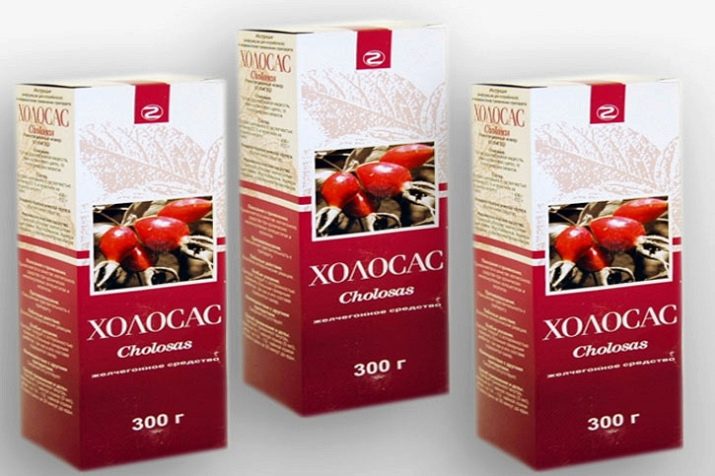
Tips
Before using the syrup, you should always consult your doctor. Also, do not forget about some features of use.
- The syrup is best stored in the refrigerator in a glass and tightly closed container.
- Do not use rosehip products for too long. The recommended course is one month. After it, you should take a break for at least 10-14 days.
- If you have diabetes, you can always replace the pharmacy drug with a sugar-free syrup prepared using gelatin.
- After drinking the syrup, it is recommended to rinse your mouth with warm water to avoid a negative effect on tooth enamel.


















